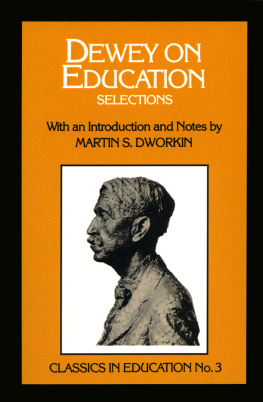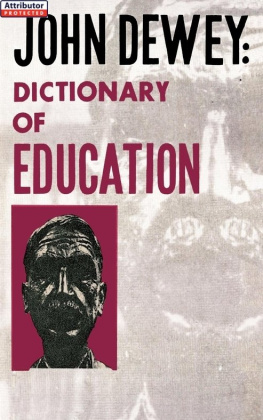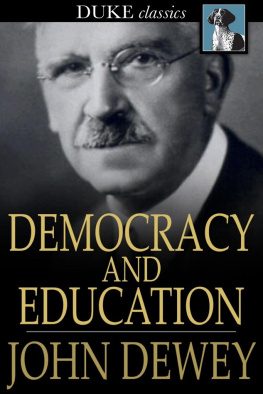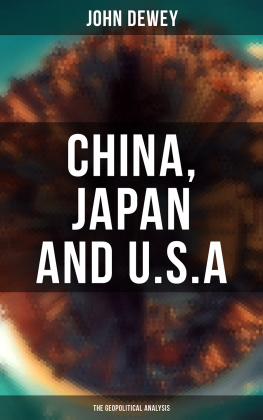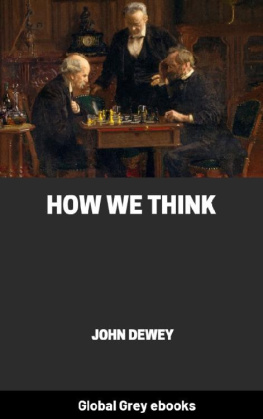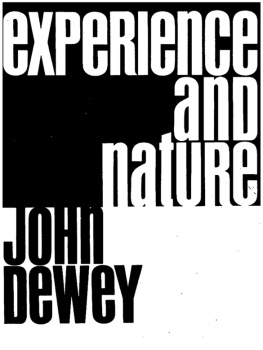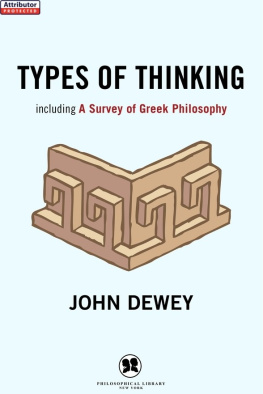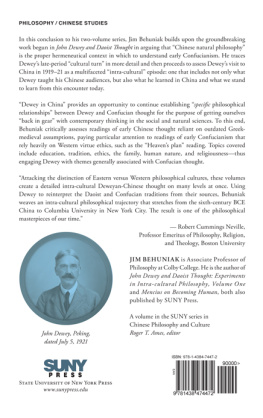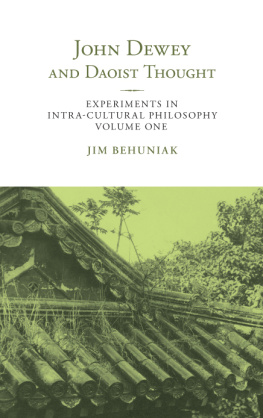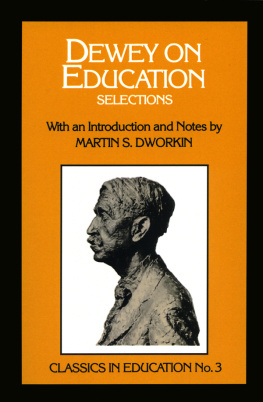John Dewey - Dewey on Education
Here you can read online John Dewey - Dewey on Education full text of the book (entire story) in english for free. Download pdf and epub, get meaning, cover and reviews about this ebook. year: 1959, publisher: Teachers College Press, genre: Science. Description of the work, (preface) as well as reviews are available. Best literature library LitArk.com created for fans of good reading and offers a wide selection of genres:
Romance novel
Science fiction
Adventure
Detective
Science
History
Home and family
Prose
Art
Politics
Computer
Non-fiction
Religion
Business
Children
Humor
Choose a favorite category and find really read worthwhile books. Enjoy immersion in the world of imagination, feel the emotions of the characters or learn something new for yourself, make an fascinating discovery.
- Book:Dewey on Education
- Author:
- Publisher:Teachers College Press
- Genre:
- Year:1959
- Rating:4 / 5
- Favourites:Add to favourites
- Your mark:
- 80
- 1
- 2
- 3
- 4
- 5
Dewey on Education: summary, description and annotation
We offer to read an annotation, description, summary or preface (depends on what the author of the book "Dewey on Education" wrote himself). If you haven't found the necessary information about the book — write in the comments, we will try to find it.
Dewey on Education — read online for free the complete book (whole text) full work
Below is the text of the book, divided by pages. System saving the place of the last page read, allows you to conveniently read the book "Dewey on Education" online for free, without having to search again every time where you left off. Put a bookmark, and you can go to the page where you finished reading at any time.
Font size:
Interval:
Bookmark:

Lawrence A. Cremin, General Editor
DEWEY ON EDUCATION
Selections
Introduction and Notes by Martin S. Dworkin
THE EMILE OF JEAN JACQUES ROUSSEAU
Selections
Translated and Edited by William Boyd
THE REPUBLIC AND THE SCHOOL
Horace Mann on the Education of Free Men
Edited by Lawrence A. Cremin
AMERICAN EDUCATION IN THE TWENTIETH CENTURY
A Documentary History
Edited by Marvin Lazerson
THE SUPREME COURT AND EDUCATION
(Third Edition)
Edited by David Fellman
JANE ADDAMS ON EDUCATION
Edited by Ellen Condliffe Lagemann
THE EDUCATED WOMAN IN AMERICA
Selected Writings of Catharine Beecher, Margaret Fuller, and M. Carey Thomas
Edited by Barbara M. Cross
THE THEORY OF EDUCATION IN THE REPUBLIC OF PLATO
By Richard Lewis Nettleship
Foreword by Robert McClintock
NOAH WEBSTERS AMERICAN SPELLING BOOK
Introduction by Henry Steele Commager
UTOPIANISM AND EDUCATION
Robert Owen and the Owenites
Edited by John F. C. Harrison
EMERSON ON EDUCATION
Selections
Edited by Howard Mumford Jones
AMERICAN EDUCATION AND VOCATIONALISM
A Documentary History, 18701970
Edited by Marvin Lazerson and W. Norton Grubb
DESIDERIUS ERASMUS CONCERNING THE AIM AND METHOD OF EDUCATION
By William Harrison Woodward
Foreword by Craig R. Thompson
JOHN LOCKES OF THE CONDUCT OF THE UNDERSTANDING
Edited by Francis W. Garforth
BENJAMIN FRANKLIN ON EDUCATION
Edited by John Hardin Best
QUINTILIAN ON EDUCATION
Selected and Translated by William M. Small
JOSEPH LANCASTER AND THE MONITORIAL SCHOOL MOVEMENT
A Documentary History
Edited by Carl F. Kaestle
THE EDUCATIONAL THEORIES OF THE SOPHISTS
Edited by James L. Jarrett
an Introduction and Notes
by Martin S. Dworkin
CLASSICS IN
No. 3
EDUCATION

1959 by Martin S. Dworkin
Library of Congress Catalog Card Number
59-15893
ISBN 978-0-8077-1263-4 (paper)
ISBN 978-0-8077-7635-3 (ebook)
I T SEEMS the fate of every influential thinker to be much discussed but little read in the years immediately after his death. John Dewey is no exception. His writings have been translated into a dozen different languages; many are still in print; almost all are widely available. Yet contemporary educational discussion is filled with the shoddiest misconceptions of what he said; and disciples and critics alike have purveyed the grossest caricatures of his work. This volume, third in the Classics in Education series, ought to do much to clear the air. Mr. Dworkin has gathered together some of Deweys clearest and most characteristic statements on education, and set them in the stream of American social and intellectual history. In addition, he has indicated some of the rich literature available to those who would probe more deeply into Deweys ideas and the context in which they matured. Most important, perhaps, he has asked his readers neither to worship nor to damn Dewey, but rather to ponder himwhich is, after all, what Dewey himself would most have appreciated.
L AWRENCE A. C REMIN
by Martin S. Dworkin
One hundred years after his birth, John Dewey is a figure of partisan fiction. Extreme disavowals of his importance are countered by passionate assertions of his greatness. Careful reappraisal of his work is itself ridiculed or ignored, either as part of a continuing conspiracy or as unnecessary annotation of explicit scriptures. The images of Dewey created in this kind of clamor may say a great deal about American attitudes at mid-centuryas well as about traditional tendencies to view controversies as epic melodramas of heroes versus villains. But because Dewey played so consequential a part in American life, and had so profound an influence throughout the world, the fictitious figures of denied importance or affirmed greatness only block our view of the stage on which he moved and the drama in which he was a principal. Not only are we hindered in the necessary business of dealing with the many unclarities and unresolved difficulties of his work. We are prevented from seeing clearly the background of events and movements of ideas that we must rehearse and reexamine in order to know ourselves and the world in which we live.
Deweys career was the longest among those philosophers for whom there are substantial and verifiable records. The range and quantity of his writings attest not merely his spirited activity until the very end of his life, but the astonishing vigor of the mind that was at work. His first publication, which appeared when he was But of all his published work, it is his writings on education that have exerted the widest and deepest influences upon life in the United States and other countries. And it is in the area of education that the question of his stature is presently most embattled and directly involved with issues which are among the most vital and urgent facing us today.
Irwin Edman remarked that it was a historical accident that Dewey became widely known as an educator long before he became equally widely influential as a professional philosopher. That accident conformed to Deweys essential intent. dent that is intentional. The paradox, at the least, that is suggested introduces the consideration of the place of Deweys writings on education in the whole of his work. And this consideration leads further to the fundamental problem of the actual nature of his influence upon American education. To what extent, we must ask, was Deweys impact unique, novel, truly innovative? And to what extent was it a product or expression of larger, ultimately determinant forces in American life? In dealing with these questions, more is involved than the inescapable task of understanding Deweys work in order to criticize it. For Deweys responsibility for the form and substance of American education has been one of the most persistent expletives of the bitter brawling over the schools, especially in the last decade. Was Deweys influence accidental? Or was it inevitable? In either case, was it crucial?
We know far more about the background and development of Deweys philosophy than we do about the context within which his educational ideas took on their power. One reason for this is surely the tendency in the genteel tradition of American scholarship to regard the study of education as worth no more than discreet afterthought. This attitude was attacked by Dewey himself as revealing a sadly inadequate understanding of what knowledge is, and an even sadder ignorance of how knowledge is to be made to benefit our lives. In fact, Deweys gradual rejection of traditional philosophy took place during the period when he began to actively concern himself with problems of teaching and learning. It is a naive simplification to say, with many admirers and detractors of Dewey, that he broke with the tradition primarily or principally because of his emerging educational theories. What does appear reasonable, however, in the light of the influences bearing upon his early intellectual development, is that both his reaction against his own earlier philosophical training and his commitment to education were related in their origin.
Font size:
Interval:
Bookmark:
Similar books «Dewey on Education»
Look at similar books to Dewey on Education. We have selected literature similar in name and meaning in the hope of providing readers with more options to find new, interesting, not yet read works.
Discussion, reviews of the book Dewey on Education and just readers' own opinions. Leave your comments, write what you think about the work, its meaning or the main characters. Specify what exactly you liked and what you didn't like, and why you think so.

